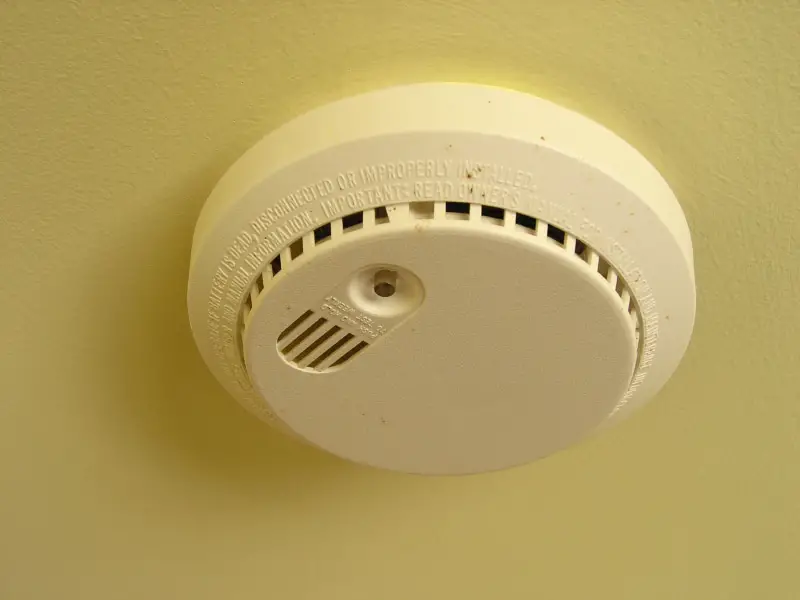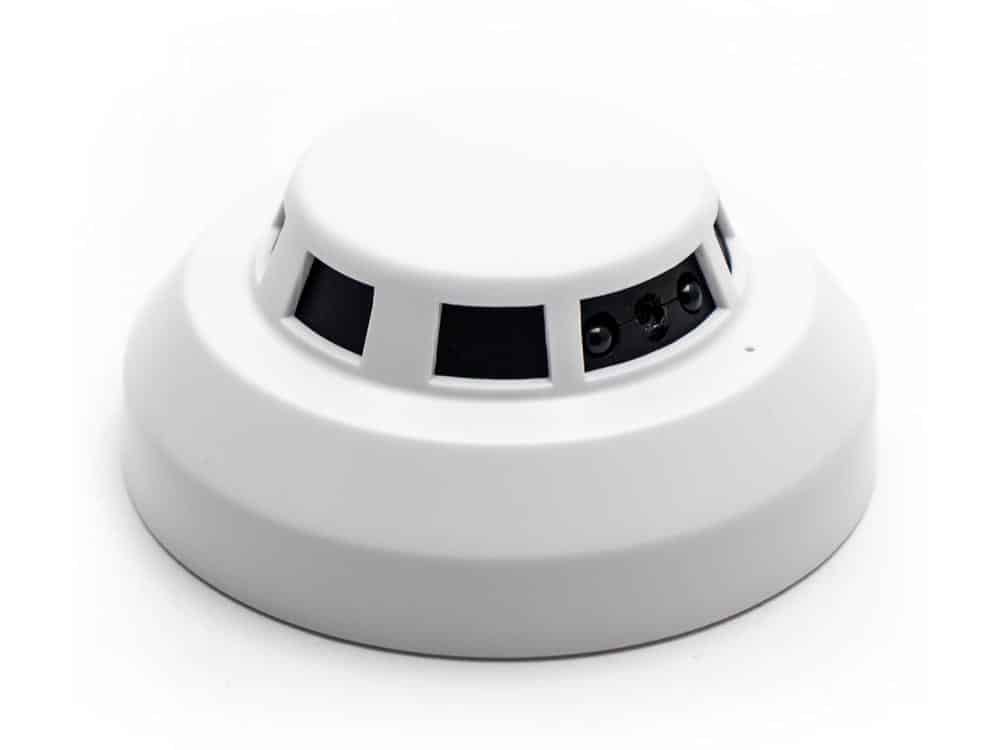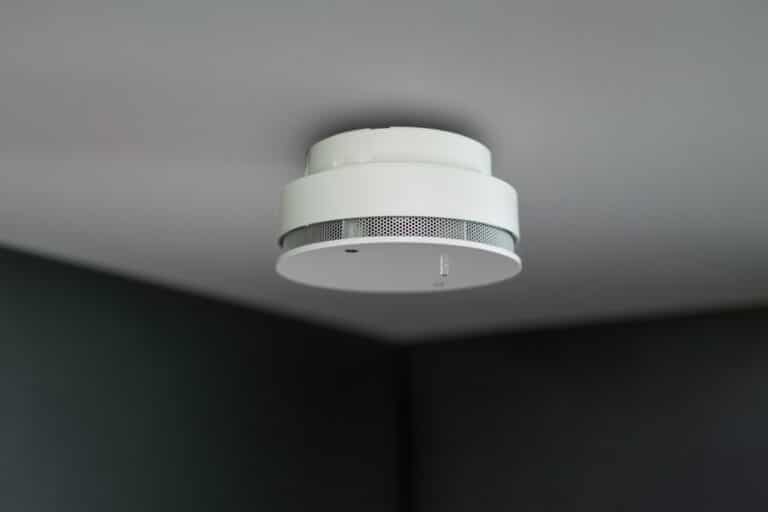Introduction
How Long Do Smoke Detectors Last: Smoke detectors are an essential component of any home or building’s safety system. These devices are designed to detect the presence of smoke and alert occupants to the potential danger of a fire. However, like any electronic device, smoke detectors have a limited lifespan and will eventually need to be replaced. In this article, we will explore the average lifespan of smoke detectors and discuss the factors that can affect their longevity.
Usually, smoke alarms are powered by batteries or hooked up to a building’s electricity. Smoke detectors that are hardwired are most often used in commercial buildings, while battery-powered smoke detectors are most popular in homes. Smoke alarms have a limited life span because the parts inside them break down over time, no matter what power source they are using.
The average lifespan of a smoke detector can vary depending on several factors. One of the primary factors is the type of smoke detector. Ionization smoke detectors, which use a small amount of radioactive material to detect smoke particles, typically have a lifespan of 8 to 10 years. On the other hand, photoelectric smoke detectors, which use a beam of light to detect smoke particles, can last up to 15 years. The quality of the smoke alarm is another thing that can affect how long it lasts. Smoke alarms that cost more may not last as long as ones that cost less because they are made with less durable parts. Maintaining and testing smoke detectors on a regular basis can also help them last longer by making sure they work properly and sense smoke well.
How do I know if my smoke detector needs replacing?
Smoke detectors are an essential safety feature in any home or building. They are designed to detect the presence of smoke and alert occupants to the potential danger of a fire. However, like any electronic device, smoke detectors can wear out over time and may need to be replaced. So, how do you know if your smoke detector needs replacing?
An intermittent beeping or chirping smoke detector is a clear sign that it requires replacing. The battery may be low and needs to be replaced. If the beeping continues after replacing the battery, the smoke detector may be defective and need to be replaced.
If your smoke detector doesn’t respond to testing, it needs replacing. Most smoke detectors contain a test button to verify operation. If the test button does nothing, the smoke detector may need to be replaced.
In addition to these symptoms, smoke detector age is significant. Smoke detectors typically last 10 years. Smoke detector sensors may become less sensitive and reliable after this time. If your smoke detector is over 10 years old, replace it.
Damaged or overheated smoke detectors should be replaced. Dropped or damaged smoke detectors should be replaced. Extreme heat or cold may also damage smoke detectors, so replace them.

What is the average lifespan of a smoke detector?
In this case, “average lifespan” means the amount of time that a smoke detector should work properly and successfully. Smoke alarms are important tools that help keep homes and businesses safe from fire hazards by finding smoke and warning people of possible danger.
Most smoke alarms last for 10 years. This means that after 10 years, a smoke monitor may not work as well or as reliably. Over time, smoke alarm sensors and parts can break down or stop working. For the best results, smoke detectors should be changed every 10 years.
But smoke detectors’ useful lives depend on a number of factors. Quality and brand can affect how long a smoke alarm lasts. Smoke alarms that aren’t as good may not last as long. Smoke detectors can also be damaged by things in the environment, like humidity, temperature, and dust.
Regular maintenance and testing can extend smoke detector life. Test smoke detectors monthly to maintain proper operation. Pressing a smoke detector test button confirms the alarm. Cleaning the smoke detector periodically to eliminate dust and debris can also prolong its life.
Do smoke detectors only last 10 years?
Smoke detectors are an essential safety feature in every home, providing early warning in the event of a fire. However, like any electronic device, smoke detectors have a limited lifespan. It is commonly believed that smoke detectors only last for 10 years before they need to be replaced. But is this really the case?
Smoke detectors usually last 10 years. This is because smoke detector sensors can grow less sensitive with time, making them less effective. Smoke detector batteries also degrade with time, diminishing their power. Thus, smoke detectors should be replaced every 10 years to ensure optimum operation.
Note that not all smoke detectors are equal. Models may last longer or shorter. Always check the manufacturer’s directions for a smoke detector’s lifespan.
To work right, smoke alarms need to be tested and maintained on a regular basis. This means replacing, cleaning, and checking the batteries on a regular basis to make sure they work well. Every month, you should press the test button on a smoke detector and listen for the warning to go off. The smoke alarm might need to be replaced if it doesn’t work.
Some newer smoke alarms may have features that make them last longer. It Some types can figure out when they need to be changed on their own and let the owner know. Some of them have sealed lithium batteries that don’t need to be replaced for 10 years.
How do I know if my smoke detector is expired?
Smoke detectors are an essential safety feature in any home or building. They are designed to detect the presence of smoke and alert occupants to the potential danger of a fire. However, like any other device, smoke detectors have a limited lifespan and can expire over time.
Check the label or paperwork that came with your smoke alarm to see if it’s out of date. A lot of smoke alarms should last between 8 and 10 years. The end or replacement date might be written on the label or in the user guide. Once the smoke detector’s expiration date has passed, it needs to be replaced.
Look for wear and tear or damage to discover if your smoke detector is expired. Smoke detectors can degrade owing to dust, sensor degradation, or physical damage. Smoke detectors with cracked casings or discolored sensors are expired and need to be replaced.
Some smoke alarms have built-in expiration or replacement lights as well. These alerts can come in the form of voice messages, bright lights, or beeping sounds. If any of these things happen, your smoke alarm is no longer valid and needs to be changed.
Even when your smoke detector isn’t expired, test it periodically to make sure it’s operating. Use smoke detector test spray or the device’s test button. Test and maintain your smoke detector to detect and warn of fires.
Do 10-year smoke alarms last 10 years?
Every home should have a smoke alarm because they let you know right away if there is a fire. It’s very important to make sure that these gadgets work right and can be trusted. A question that comes up a lot is whether 10-year smoke alarms really do last the whole time they say they will.
This question has a complicated answer. 10-year smoke alarms are supposed to last a decade, but various factors can shorten its lifespan. Alarm quality is crucial. Reputable smoke alarms last longer than cheaper, lower-quality ones.
Installation environment might also affect a 10-year smoke alarm’s longevity. Environmental factors can impact smoke alarms, which are sensitive. For instance, high humidity or temperatures might limit alarm lifespan. In order to prolong smoke alarm life, install them in regions with minimal circumstances.
An effective and long-lasting 10-year smoke alarm requires regular maintenance and testing. To maintain optimum operation, these alarms should be tested often even if they last a decade. Press the alarm’s test button or use a smoke alarm test spray.
Smoke detectors typically last 10 years. This varies by smoke detector type and model. Some smoke detectors last 5-7 years, while others last 15+. To calculate your smoke detector’s lifespan, consult its manufacturer’s instructions.
Smoke alarms only last for a certain amount of time because sensors and other parts wear out. It’s possible that older smoke alarms are less sensitive and less reliable at finding smoke and sounding the alarm. To keep a building or home safe, smoke detectors need to be changed before their time is up.
Are there any factors that can affect the longevity of smoke detectors?
Yes, there are a number of things that can shorten the life of smoke alarms. The type of smoke alarm being used is an important factor. The two main types of smoke alarms are photoelectric and ionization. Ionization smoke detectors may need to be changed more often because they go off more often when they’re not really there. Photoelectric smoke alarms, on the other hand, tend to be more reliable and last longer.
The environment in which smoke detectors are placed is another thing that can affect how long they last. Place smoke alarms in places where the temperature stays stable and the humidity is low. High humidity can harm the smoke detector’s internal parts and shorten its useful life. In the same way, extreme temperatures can also make the smoke alarm less effective and shorten its life.
How often should smoke detectors be replaced?
Smoke detectors should be replaced every 10 years. This is because the sensors in smoke detectors can become less sensitive over time, making them less effective at detecting smoke and fire. Additionally, the batteries in smoke detectors should be replaced at least once a year, or whenever the low battery indicator starts to beep. It is important to regularly test smoke detectors to ensure they are functioning properly, and replace them if they are not.
Replacing smoke detectors every 10 years is a general guideline, but it is also important to consider other factors that may affect the lifespan of a smoke detector. For example, if a smoke detector has been exposed to excessive dust, dirt, or humidity, it may need to be replaced sooner. Similarly, if a smoke detector has been damaged or tampered with, it should be replaced immediately, regardless of its age.
Are there any signs or indicators that a smoke detector needs to be replaced?
Yes, there are several signs and indicators that can indicate the need to replace a smoke detector. One of the most obvious signs is when the smoke detector starts beeping or chirping consistently. This usually indicates a low battery, but if replacing the battery doesn’t stop the beeping, it may be a sign that the smoke detector itself needs to be replaced. Another indicator is if the smoke detector is more than 10 years old. Over time, the sensors in smoke detectors can become less sensitive, so it’s recommended to replace them after 10 years.
Additionally, if you notice any physical damage to the smoke detector, such as a cracked or discolored cover, it’s important to replace it. Physical damage can affect the performance of the smoke detector and may prevent it from properly detecting smoke or fire. It’s also important to replace a smoke detector if it has been triggered by a false alarm multiple times. This could indicate a malfunction in the detector and it’s best to replace it to ensure reliable performance in the event of a real emergency.
What are some maintenance tips to ensure the longevity of smoke detectors?
Maintaining smoke detectors is crucial to ensure their longevity and effectiveness in detecting smoke and fire. Here are some maintenance tips to follow:
1. Test regularly: It is important to test your smoke detectors at least once a month to ensure they are functioning properly. Most smoke detectors have a test button that you can press to check if the alarm sounds. If the alarm does not sound, replace the batteries or the entire unit if necessary.
2. Clean regularly: Dust and debris can accumulate on the sensors of smoke detectors, affecting their performance. Use a vacuum cleaner or a soft brush to gently clean the detectors and remove any dirt or dust. Avoid using harsh chemicals or water, as they can damage the detectors.
3.Change the batteries: Smoke alarms need new batteries every so often because they usually run on batteries. The batteries should be changed at least once a year or when the low battery alarm goes off. To make sure the devices work right, you should always use good batteries.

Conclusion
Smoke detectors are an essential safety feature in any home or building. They are designed to detect the presence of smoke and alert occupants to the potential danger of a fire. However, like any electronic device, smoke detectors have a limited lifespan and will eventually need to be replaced. The question of how long smoke detectors last is a common one, and the answer depends on several factors.
The type of smoke detector is one of the most important things that decides how long it will last. The two main types of smoke alarms are photoelectric and ionization. Ionization smoke detectors look for smoke particles with a small amount of radioactive material. Photoelectric smoke detectors, on the other hand, look for smoke with a beam of light. The pros and cons of each type of device are different, but in general, they last for about 10 years. The quality of the smoke alarm is another thing that can affect how long it lasts. Smoke alarms that are made with better materials and parts are likely to last longer than models that are less expensive but not as good. It’s important to get a smoke detector from a reputable company and to try and maintain it on a regular basis to make sure it works.
In addition to the type and quality of the smoke alarm detector, environmental factors can also impact its lifespan. Smoke detectors that are exposed to high levels of dust, humidity, or extreme temperatures may not last as long as those in more controlled environments. It is important to install smoke detectors in appropriate locations and to regularly clean and inspect them to ensure they are functioning properly.

